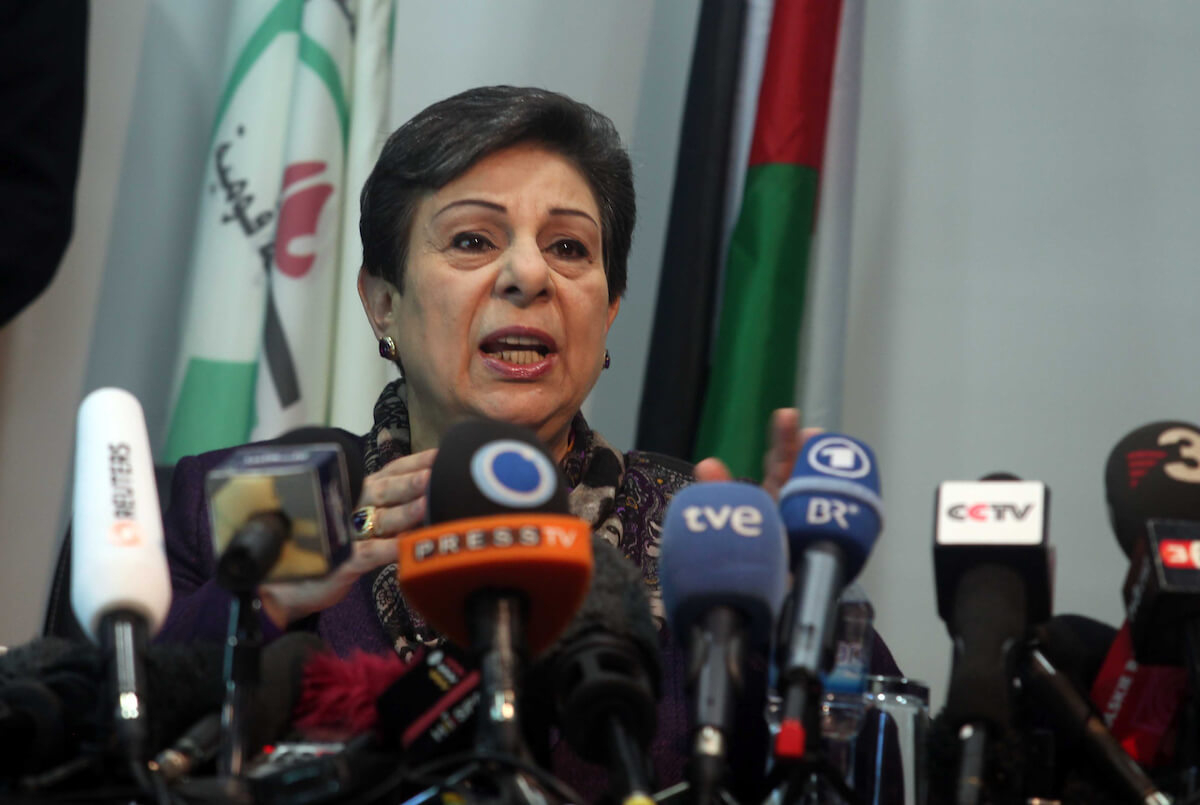
In the wake of leaked reports in early December that Dr. Hanan Ashrawi had resigned from the Palestinian Liberation Organization Executive Committee, the veteran Palestinian politician confirmed, in a statement posted on the Twitter account of the PLO Department of Public Diplomacy and Policy, which she heads, as well as a recorded statement she posted on her Twitter account, that she had indeed submitted her resignation, initially to be effective in 2021. Shortly thereafter, the PLO also posted an official translation of the letter she had turned in, on November 26, to Palestinian Authority President Mahmoud Abbas.
Ashrawi gave no immediate reason for her resignation, yet called for political reform within the PLO. Both in her recorded statement and her letter of resignation, she assures her audience that she will “continue to serve the Palestinian people and our just cause in every capacity, albeit outside public office” (emphasis added).
Ashrawi’s call for reform has reignited a discussion many activists and organizers grapple with, namely, can change to a systemic problem happen from within? By resigning her official post, while asserting her continued commitment to the cause, Dr. Ashrawi seems to suggest this is not the case.
There is ongoing speculation that Ashrawi resigned from the PLO in protest over the Palestinian Authority’s decision to resume security coordination with Israel, even though Ashrawi denies that in her message. Some are questioning on social media why she would seek to dispel these rumors, as if resigning over collusion with Israel were not the right thing to do? But one question that must be asked is: could the PA do anything other than resume such coordination? Is that not the very reason for its existence: being a subcontractor of the occupation? And sadly, since the Oslo Accords, the PA has totally eclipsed the PLO, rendering the latter largely impotent. Ashrawi herself became a member of the PA’s legislative council in 1996, serving in various PA capacities since then. For decades, she functioned within a system that represented the defeat of Palestinian resistance and aspirations to justice: the PA is nothing if it is not the master’s tools, fashioning the master’s house.
Ashrawi’s statement calls for greater inclusivity at the leadership level: “The Palestinian political system needs renewal and reinvigoration with the inclusion of youth, women, and additional qualified professionals.” She herself was a member of the Executive Committee of the PLO, which is different from the Palestinian Authority, although both are headed by President Mahmoud Abbas, to whom she submitted her resignation.
The PLO itself, with its archaic non-elected structure, is the “sole political representative” of the Palestinian people, including being the representative of Palestine as a non-member, “observer state” at the United Nations. Yet the members of the Executive Committee are appointed, not elected. So how can the PLO become more diverse, more inclusive? ot just by bringing in more young people, and women, and “qualified professionals,” but rather by involving radical change makers, young and old, men and women and gender-non-conforming, whose qualifications may not have been obtained in prestige schools, but were honed instead in the streets and glamourless community-based organizational meetings. But why would such individuals even want such an affiliation, when career politicians, such as Dr. Ashrawi herself, could not serve our people through this channel?
The Palestinian people has a wealth of awe-inspiring youth, both in the homeland and throughout the global Diaspora—one group that immediately comes to mind is the Palestinian Youth Movement, with its sharp analysis and decolonial praxis. Palestinian women, not necessarily all young, are accomplishing great feats on a daily basis, preserving and celebrating our culture, heading legal defense offices, teaching, writing, and debating and shutting down Israel apologists. Queer organizers have a deep understanding of the need for liberation from all oppressive systems, from the Israeli occupation of our entire homeland, from the river to the sea, but also, our liberation from the patriarchy and toxic masculinity that predate Europe’s settler-colonial claim to our land. The young women of Tal’aat know better than to blame Zionism for the horrific so-called “honor crimes” that plague our society, murdering its independent, life-loving women. The BDS movement, which more than any other resistance strategy, has transformed the discourse about Israel, and Zionism, showing it for the violently racist ideology it is, is first and foremost a civilian-led movement, envisioned by non-politicians. These change-makers are achieving their victories big and small—victories for the Palestinian people and our cause–precisely because they are blazing new trails, not functioning within the system.
The alternative is already there. It is amorphous, and vibrant. It is growing, and bringing about the much-needed transformations, “outside of public office,” as Dr. Ashrawi assures us she will now be doing. These many spaces are where the real possibilities for liberation are nurtured. For there is little reason to believe Ashrawi’s departure will bring about the “renewal and reinvigoration” her own active participation in the system could not generate there.
 RSS Feed
RSS Feed















 December 12th, 2020
December 12th, 2020  Awake Goy
Awake Goy  Posted in
Posted in  Tags:
Tags: 













